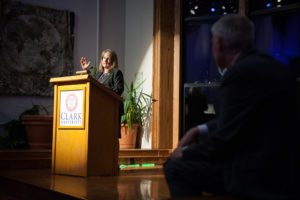
The millennial generation is lazy, entitled and disloyal.
That all sounds pretty terrible if it’s true. But it’s not, Lauren Stiller Rikleen ’75 told an alumni audience at the May 15 Reunion Dinner in Tilton Hall.
Rikleen, an author and nationally recognized expert on developing a multigenerational workforce, was the weekend’s keynote speaker, and she was quick to point out that millennials are getting a bad rap. She also noted that the research into emerging adulthood done by Jeffrey Jensen Arnett, research professor in psychology at Clark, greatly informed her work on the topic.
“This generation is entering the workplace more negatively stereotyped than any other generation before it,” she said.
In truth, Rikleen said, millennials are facing huge hurdle not encountered by earlier generations, like crushing student debt and the fact that they pay into entitlement programs to which they may never have access. “There’s a real fear about what the future holds for them,” she said. Some experience a level of stress and anxiety characterized as a “quarter-life crisis.”
Contrary to popular perception, millennials don’t require constant positive feedback, but they do crave input and transparency in the workplace, Rikleen said. They are typically not entitled, but have been raised to be more self-confident, which can be misread by older co-workers as arrogance, she said.
Millennials also battle the label that they’re job-hoppers, Rikleen said. They are loyal to individuals, such as a good supervisor, but they are not “institutionally loyal.” Their commitment to the workplace is hurt by inflexibility, a lack of fairness and poor management around them, she said, and they value a healthy work-life balance more so than earlier generations.
Rikleen recently wrote the book “You Raised Us — Now Work With us: Millennials, Career Success, and Building Strong Workplace Teams.” She offered a series of tips, including giving millennials career counseling at a younger age, improving employee orientation processes, and providing training on how to effectively give and receive feedback.
“If the workplace can adjust its talent and employment integration strategies, it’s better for all,” Rikleen said.
Following Rikleen’s presentation, the Distinguished Service Award was given to civil rights activist and longtime judge, D’Army Bailey ’65, LL.D. ’10, P ’00. A family emergency prevented Bailey from attending the reception, and Dr. David Trimble ’67 accepted on his behalf. Trimble spoke of his friend’s lifetime of work in the social justice arena. He noted that Bailey spearheaded the campaign to turn the Lorraine Motel in Memphis, the site of Martin Luther King’s assassination, into the National Civil Rights Museum, a place “that’s not a monument to the past, but an inspiration to future generations.”
Michelle Powers ’05 was given the Young Alumni Award. Powers was on her honeymoon and could not attend. Clark President David Angel spoke of her accomplishments in the area of fundraising and development for a number of higher education institutions and her advocacy and commitment that have made her “a great ambassador for Clark University.”
The dinner helped kick off a full weekend of events that including the Spree Day Picnic, Dancing Under the Stars, various symposia, and a tribute to Sharon Krefetz, professor of political science, marking her retirement after 43 years at Clark.
